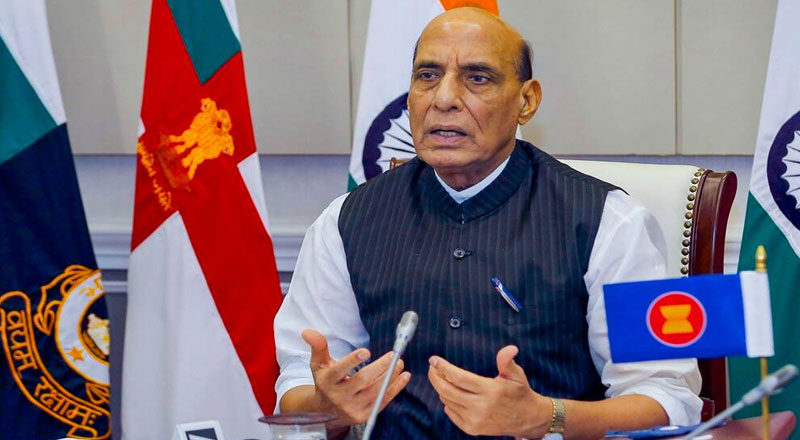Self-reliance is not an option but a necessity, as India is facing a double threat on its borders, along with new dimensions of warfare that are emerging in today’s fast-changing world. This was stated by Raksha Mantri Shri Rajnath Singh during a defence dialogue on ‘Aatmanirbhar Bharat’ organised by STRIVE think-tank, a veterans’ initiative, and a media organisation in Lucknow, Uttar Pradesh on June 17, 2023.
The Raksha Mantri termed a strong & self-reliant military as the backbone of a sovereign nation, which besides protecting the borders, safeguards the country’s civilisation and culture. He asserted that the Government, under the leadership of Prime Minister Shri Narendra Modi, is ensuring that the Armed Forces are not dependent on foreign weapons & equipment, emphasising that the real strength lies in being ‘Aatmanirbhar’, especially when an emergency situation arises.
Shri Rajnath Singh shared his insights on the paradigm shift brought about by technology in the nature of warfare. He stressed on the need to develop indigenous state-of-the-art weapons and platforms that equip & prepare the Armed Forces to tackle new and emerging challenges.
“Most of the weapons today are electronic-based systems, which can reveal sensitive information to the adversaries. As imported equipment has certain limitations, we need to go beyond the horizon and achieve self-reliance in niche technologies. Latest weapons/equipment are equally important as the bravery of our soldiers. If India wishes to become a military power at the global level, there is no other option than being self-reliant in defence manufacturing,” the Raksha Mantri said.
Listing out the advantages of being ‘Aatmanirbhar’, Shri Rajnath Singh stated that it would not only decrease the expenditure on imports, but also multi-dimensionally benefit the civil sector. He called for developing dual use technology that, besides strengthening the defence sector, improves the standard of living of the people.
The Raksha Mantri enumerated the steps taken by the Government to create a robust defence ecosystem, which not only caters to the domestic requirements, but also fulfills the security needs of friendly countries. These include setting up of Defence Industrial Corridors (DIC) in Uttar Pradesh and Tamil Nadu; earmarking of record 75 per cent of defence capital procurement budget (approx. Rs one lakh crore) for domestic industry in Financial Year 2023-24; 25 per cent R&D budget for private industry and Innovations for Defence Excellence (iDEX) initiative & Technology Development Fund to promote start-ups.
On the UP DIC, Shri Rajnath Singh said that the work is going on in mission mode and 95% of around 1,700 hectares of land has been acquired till date. Of these, 36 industries and institutions have been allotted nearly 600 hectares of land. 109 MoUs have been signed, with an estimated investment value of more than Rs 16,000 crore. So far, a total investment of about Rs 2,500 crore has been made in UPDIC by various entities. The corridor will not only produce spare parts, but also manufacture and assemble Drones/Unmanned Aerial Vehicles, Electronic warfare, Aircraft & BrahMos missiles.
The Raksha Mantri highlighted that the Government’s efforts in the last few years have resulted in over Rs one lakh crore defence production and nearly Rs 16,000 crore exports in Financial Year 2022-23. He exuded confidence that the defence exports will soon cross Rs 20,000 crore mark. “We are moving ahead at an unprecedented pace to achieve the Prime Minister’s vision of making India a developed nation by 2047. The aim is to build an economically powerful and completely self-reliant India, which is also a net defence exporter,” he added.
Chief Nodal Officer for UP DIC Air Chief Marshal RKS Bhadauria (Retd), officers of the Armed Forces & DRDO and representatives of the industry and academia were present on the occasion.





